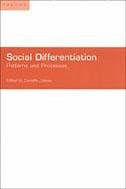Social Differentiation examines the economic, political, and normatively-defined relations that underlie the construction of social categories. Social differentiation, embedded in inequalities of power, status, wealth, and prestige, affects life chances of individuals as well as the allocation of resources and opportunities. Starting with a theoretical framework that discards traditional analyses of the other, the contributors focus on four specific strands of social differentiation: gender, age, race/ethnicity, and locality. They explore the historically specific social practices, policies, and ideologies that produce distinct forms of inequality, in turn revealing and explaining such issues as the formation and maintenance of a gendered order; the privileging of prime age workers; the penalty incurred by visible minorities in the labour market; the highly disadvantaged position of Aboriginals; and the economic decline of agriculture, resource, and fishing dependent regions. By paying special attention to political processes, norms, and representations, and by indicating how social policies shape economic functioning and relate to normative definitions, this book will interest policy-oriented researchers and decision-makers.
Hinweis: Dieser Artikel kann nur an eine deutsche Lieferadresse ausgeliefert werden.
Hinweis: Dieser Artikel kann nur an eine deutsche Lieferadresse ausgeliefert werden.








